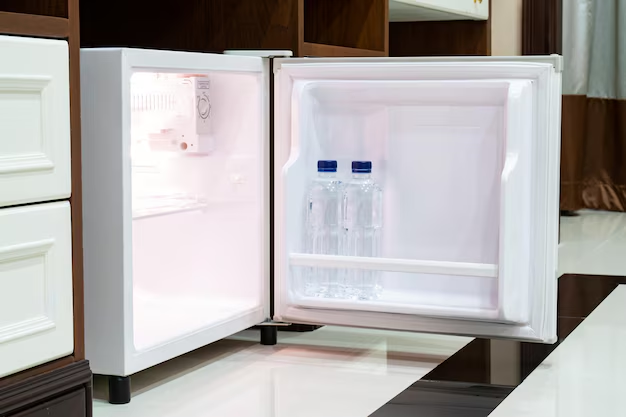Why Is My Refrigerator Always Running? A Guide to Understanding and Solving the Issue
You've likely heard the age-old joke: "Is your refrigerator running? Then you better go catch it!" While it may seem light-hearted, a perpetually running refrigerator is no laughing matter. It can lead to increased energy bills and potential food spoilage if not addressed promptly. As such, it's crucial to understand why this happens, what it means for your food storage, and how you can tackle the issue. Here, we'll delve into the reasons behind incessantly running refrigerators, offering practical guidance to resolve the problem effectively.
Understanding Your Refrigerator’s Habits
Refrigerators play a vital role in food storage by maintaining a stable environment to ensure longevity and freshness. However, when it seems like your fridge is bordering on overtime, it’s essential to consider multiple factors.
What Constitutes Normal Refrigerator Operation?
Before jumping to conclusions, it's helpful to decipher what is considered normal for a refrigerator. Typically, a refrigerator cycles on and off throughout the day, running more frequently during the warmer months or after stocking it with lots of new groceries. A reasonable cycle rate is essential for keeping internal temperatures even and preventing spoilage.
Common Causes of a Constantly Running Refrigerator
Several factors can contribute to your refrigerator’s excessive running:
Temperature Settings: If you've set the thermostat too low, the appliance may struggle to reach the desired temperature, leading to increased runtimes.
Door Seals: Damaged or worn-out seals can let warm air in, causing the fridge to work harder to maintain its cool environment.
Condenser Coils: Dusty or dirty coils can hinder heat dispersion, forcing the system to run longer to achieve the required cooling.
Door Issues: Frequently opened doors or doors left ajar can affect cooling efficiency.
Faulty Components: A malfunctioning thermostat, compressor, or fan can cause irregular cycling.
Understanding these factors not only helps address immediate concerns but also aids in adopting proactive maintenance habits.
Proactive Solutions and Maintenance Tips
Once you've identified potential causes, implementing practical solutions can often resolve the issue without professional assistance. Below are some steps you can take:
Inspect and Adjust the Temperature Settings
Ensure your refrigerator settings are just right. Most guidelines recommend keeping the refrigerator at about 37-40 degrees Fahrenheit. Avoid setting it too cold, which can cause unnecessary strain on the system.
Examine and Clean the Door Seals
Faulty or dirty door seals can compromise your refrigerator’s efficiency. Regularly cleaning seals with soapy water and ensuring they’re intact can prevent air leaks. Consider replacing them if they appear worn out or damaged.
Clean the Condenser Coils
Condenser coils, typically found at the back or beneath the unit, should be cleaned approximately twice a year. Unplug your refrigerator and use a vacuum or brush to eliminate dust buildup that impairs heat dispersion.
Monitor Door Usage
Forgetting to close the fridge door can lead to increased energy consumption. Encourage habits like double-checking the door closure to maintain ideal internal conditions.
Seek Professional Assistance for Mechanical Issues
If basic solutions don't address the problem, consider consulting a professional. They can diagnose deeper mechanical issues such as thermostat malfunctions or compressor failures.
Balancing Energy Efficiency and Food Storage
While addressing the mechanical aspects of a refrigerator issue, understanding the relationship between its performance and food storage efficiency is beneficial.
The Impact of a Running Refrigerator on Food Storage
When a refrigerator fails to cycle off properly, food safety can be compromised due to inconsistent temperatures. This may lead to the premature spoilage of perishable goods.
Strategies for Efficient Food Storage
To maximize the efficiency of your fridge, adhere to the best practices in food storage:
Organize Strategically: Keep frequently used items within easy reach to minimize door openings.
Do Not Overfill: Blocking airflow can lead to uneven cooling. Ensure your fridge isn't too crowded.
Keep It Cool: Store items like milk and meats on the lower shelves where temperatures are more stable.
Regularly Check Expiry Dates: Rotating older items to the front helps reduce waste and maintain order.
A Quick Reference Summary
To help you swiftly identify and address your refrigerator’s excessive running, here is a handy summary:
🔧 Troubleshooting Tips
- Check thermostat settings and adjust to 37-40°F.
- Inspect and clean door seals regularly.
- Clean condenser coils biannually to ensure efficiency.
- Monitor door use to avoid unnecessary open times.
- 🚨 Call a professional if problems persist.
📦 Food Storage Pointers
- Keep often-used items accessible.
- Avoid overpacking for better airflow.
- Store perishables on lower shelves.
- Rotate items based on expiration dates.
Beyond Immediate Concerns: Longevity and Energy Considerations
Tackling the issue of a running refrigerator goes beyond immediate repairs. Thinking long-term can help you maintain an efficient appliance.
Environmental and Financial Benefits
A well-maintained refrigerator conserves energy, reducing your carbon footprint and saving on utility costs. Investing time in regular maintenance ensures efficiency and extends the appliance's lifespan.
Encouraging Energy-Smart Habits
Adopting energy-smart habits, such as turning off the lights when checking the fridge contents or avoiding keeping it open longer than necessary, can also be beneficial.
Remember, regular maintenance not only safeguards your food's shelf life but also fortifies your investment in the long run. In conclusion, by understanding the intricacies of refrigerator operation and diligently implementing maintenance strategies, you can ensure that your appliance remains a steadfast ally in your kitchen. With these insights, running refrigerators become a manageable, often avoidable, inconvenience rather than an overwhelming problem. 🧊🔌

